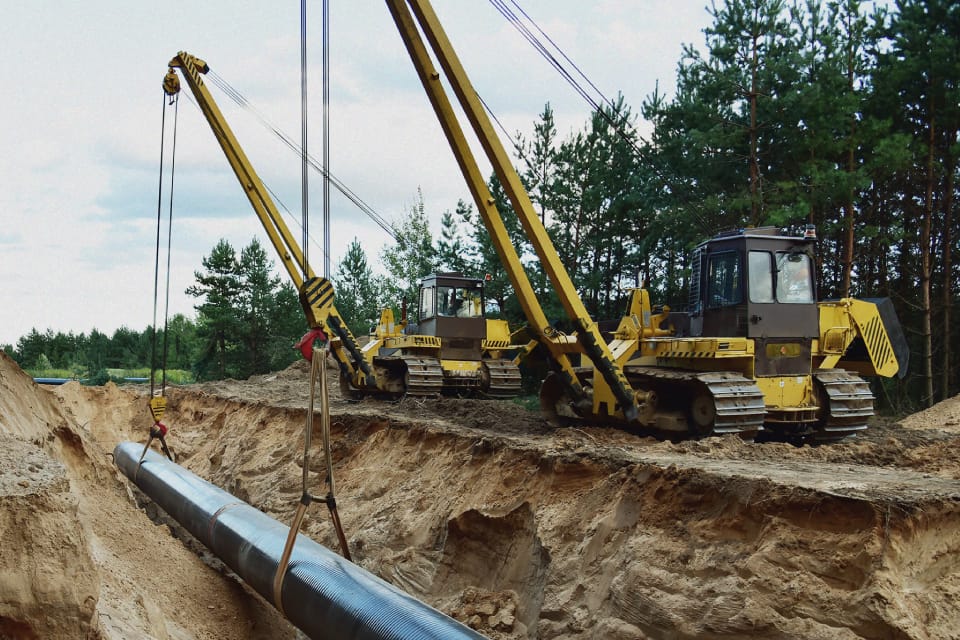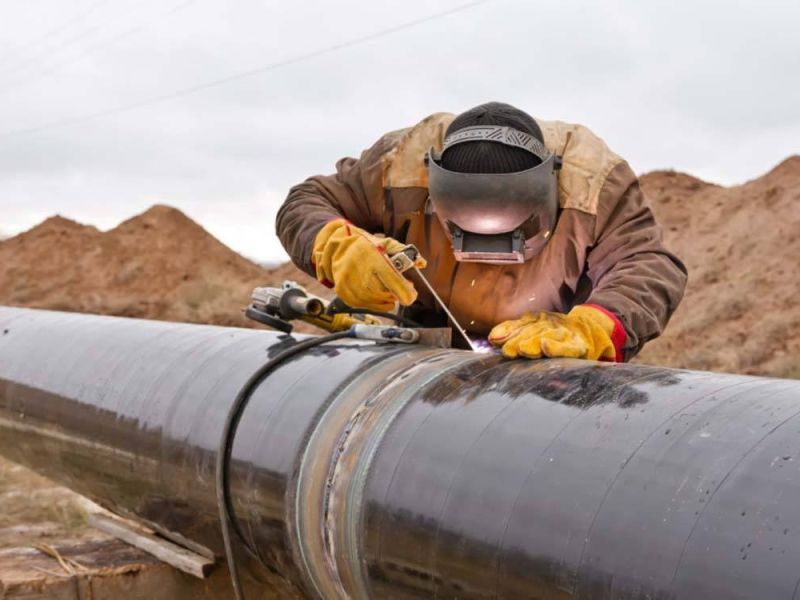A Comprehensive Guide to Understanding Pipes and Their Role in Construction
Pipelines are essential components in construction, offering vital functions in waste, gas, and water monitoring. Their option and application can substantially affect a structure's performance and safety and security. Different materials, such as PVC, copper, and PEX, offer unique benefits suited to specific demands (Creek Pipe Texas). Understanding these factors is vital for any type of building task. As one explores the intricacies of pipelines, the ramifications for conformity and public health come to be increasingly apparent
The Significance of Pipes in Construction
Pipelines act as essential avenues in construction, assisting in the movement of water, gas, and waste throughout structures and infrastructure. Their function extends beyond plain transportation; they are vital for ensuring the capability and security of residential and industrial settings. Correctly mounted pipes add to the effective distribution of resources, making it possible for daily activities such as showering, food preparation, and home heating. Pipelines play an essential role in waste management, guaranteeing that sewer and wastewater are properly gotten rid of from living spaces.The significance of pipes is likewise shown in their effect on public health. Poor or faulty piping systems can cause contamination and unsafe problems, making high quality materials and installment practices critical. In addition, pipes have to abide with numerous building regulations and guidelines, which are created to protect both occupants and the setting. Subsequently, the value of pipes in building includes both useful functionality and vital health considerations.
Sorts Of Pipes Made Use Of in Structure Projects
Numerous kinds of pipes play a considerable role in structure jobs, each designed to meet details requirements and applications. Among one of the most generally utilized pipe kinds are PVC, which is resistant and lightweight to deterioration, making it excellent for drain and vent systems. CPVC pipelines, similar to PVC, can withstand greater temperatures, commonly utilized in warm water systems. Copper pipes are known for their longevity and dependability, regularly utilized in pipes and heating applications. Galvanized steel pipelines, while much less typical today, were as soon as a standard for water supply lines because of their toughness. In Addition, PEX (cross-linked polyethylene) pipelines are getting appeal for domestic pipes as a result of their versatility and resistance to scaling and chlorine. Ultimately, cast iron pipes are favored for their sound-dampening homes, commonly utilized in waste and dirt systems. Each pipeline type serves unique functions, guaranteeing reliable operation in building and construction projects.
Typical Products for Piping and Their Feature
In building, the option of pipeline products is critical for guaranteeing resilience and performance. Metal pipelines use toughness and resistance to high pressures, while plastic pipelines supply lightweight and corrosion-resistant alternatives. Compound pipes combine the advantages of both products, making them functional options for different applications.
Metal Pipeline Options
Metal pipelines are important elements in building, supplying a variety of options that accommodate environmental conditions and different applications. The most usual materials consist of steel, copper, and cast iron. Steel pipelines are known for their stamina and toughness, making them appropriate for high-pressure applications. Copper pipelines are preferred for their corrosion resistance and antimicrobial properties, commonly utilized in plumbing systems. Cast iron pipes give outstanding audio insulation and are optimal for waste and water drainage systems. Each metal type has distinctive benefits; for instance, galvanized steel can withstand rust, while stainless steel supplies premium deterioration resistance. Choosing the proper metal pipeline depends on variables such as expense, ecological exposure, and the details needs of the building and construction job.

Plastic Pipeline Advantages
Plastic pipes have obtained appeal in construction due to their light-weight nature and flexibility. These pipes, made from products such as PVC, CPVC, and PE, offer excellent resistance to rust and chemical damage, making them appropriate for numerous applications. Their ease of installment more enhances their charm, as they can be reduced and joined without special devices. Furthermore, plastic pipelines are usually much more cost-effective compared to metal alternatives, adding to reduced overall job expenditures. Their smooth interior surfaces decrease friction and enhance circulation prices, while insulation properties help preserve temperature level control in plumbing systems - Creek Pipe Company. With a vast array of configurations and dimensions available, plastic pipelines effectively meet the varied requirements of contemporary building jobs
Compound Pipeline Characteristics
Composite pipelines integrate different products to take advantage of their specific toughness, resulting in enhanced efficiency and resilience. Normally, these pipes include layers that may include porcelains, plastics, and steels, each adding special properties. As an example, the internal layer might be made from a corrosion-resistant material, while the outer layer offers strength and impact resistance. This combination permits composite pipelines to hold up against severe temperatures and pressures, making them ideal for a vast array of applications, including water supply and commercial processes. In addition, composite pipelines are typically lighter than conventional products, assisting in simpler handling and setup. Their versatility and flexibility to different settings make them a favored selection in modern-day building projects, making sure longevity and effectiveness in liquid transport systems.
Applications of Piping in Plumbing Equipments

Electrical Channels: The Role of Piping in Circuitry
In contemporary building and construction, electrical channels play an important duty in guaranteeing the safe and effective routing of electric wiring throughout buildings. These pipelines give a protective pathway for electrical cables, guarding them from physical damages and environmental elements. Numerous materials, such as PVC, metal, and versatile channels, are made use of relying on the details needs of the installation.Furthermore, channels assist in arranging circuitry systems, reducing the danger of electric dangers like short circuits or fires. They also promote simpler maintenance and upgrades, as cords can be accessed and replaced without substantial disruption to the structure.Proper installment of electrical avenues is vital for compliance with building ordinance and security regulations. This structured strategy not just boosts the long life of the electrical system however also contributes to the overall safety and functionality of the structure, making electric avenues essential in modern construction practices.
Picking the Right Pipe for Your Job
Exactly how can one ensure the appropriate pipe choice for a building project? The option process begins with YOURURL.com understanding the particular requirements of the project, consisting of the kind of fluids being carried, pressure ratings, and ecological problems. Material options, such as Copper, pvc, and steel, should be evaluated based upon toughness, deterioration resistance, and thermal properties.Next, one have to take into consideration the pipe's size and circulation capacity to ascertain reliable operation. Governing requirements and codes should additionally be followed, as they dictate the acceptable products and methods for certain applications. Consulting with specialists and utilizing considerable resources can further help in making informed decisions.Finally, evaluating the cost-effectiveness of numerous options is crucial, balancing initial expenditures with long-lasting upkeep and replacement expenses - Creek Pipe Company. By diligently examining these factors, one can confidently pick the most appropriate pipeline for their construction job, guaranteeing both performance and conformity

Upkeep and Evaluation of Pipeline in Construction
Proper option of pipelines sets the structure for their long-lasting efficiency, making upkeep and inspection critical parts in building. Regular maintenance guarantees that any potential issues, such as leaks, deterioration, or obstructions, are identified and resolved quickly, reducing costly fixings and job hold-ups. Arranged inspections, consisting of visual analyses and pressure examinations, play a vital role in examining the stability of pipeline systems.Additionally, keeping track of ecological elements, such as temperature variations and soil problems, can help expect damage. Using innovative technologies, such as CCTV for indoor inspections, can improve the effectiveness of maintenance initiatives. It is essential to record examination findings and maintenance tasks to establish a thorough history of the pipeline systems. By focusing on have a peek at this site maintenance and assessment, building and construction professionals can prolong the life expectancy of their piping systems, ensuring they run successfully and reliably throughout the project's duration.
Often Asked Inquiries
Exactly How Do Pipes Impact Power Performance in Structures?
Pipelines considerably affect power efficiency in buildings by controling heating and cooling down systems. Proper insulation and materials lower power loss, while efficient plumbing designs reduce water usage, eventually leading to lower energy consumption and operational costs.
What Regulations Govern Pipe Installation in Construction?
Regulations governing pipe installation in building normally consist of local and national building codes, plumbing codes, and safety standards. These warranty conformity with architectural honesty, product specs, and health and wellness requirements, promoting safety and security and efficiency in building and construction techniques.
Can Water Lines Be Recycled After Use?
The inquiry of pipeline recyclability is substantial. Several materials, such as metal and particular plastics, can be recycled effectively. Nonetheless, the condition and kind of pipeline influence reusing feasibility, demanding appropriate analysis before disposal.
Exactly How Do Climate Condition Influence Pipe Efficiency?
Weather conditions significantly influence pipe efficiency. Severe temperatures can create expansion or tightening, while moisture may bring about rust. In addition, heavy precipitation can boost dirt pressure, influencing stability and total functionality of the piping system.
What Are the Indications of Pipeline Failure to Enjoy For?
Signs of pipe failing consist of leaks, unusual noises, discoloration of water, lowered water pressure, and visible rust. Normal inspections can assist detect these problems early, protecting against costly repair work and making sure system capability in the long-term. Pipes play a critical function in waste monitoring, making certain that sewer and wastewater are effectively removed from living spaces.The relevance of pipelines is additionally reflected in their impact on public health. In building, the option of pipeline products is important for making certain resilience and functionality. Steel pipelines use strength and resistance to high stress, while plastic pipes offer corrosion-resistant and lightweight choices. In addition, pipelines are made use of to get rid of wastewater, linking bathrooms, sinks, and drains to metropolitan sewage systems or septic tanks.Different kinds of pipelines, such as PVC, copper, and PEX, are picked based on aspects like toughness, price, and details application demands. Exactly how can one guarantee the right pipeline selection for a building task?